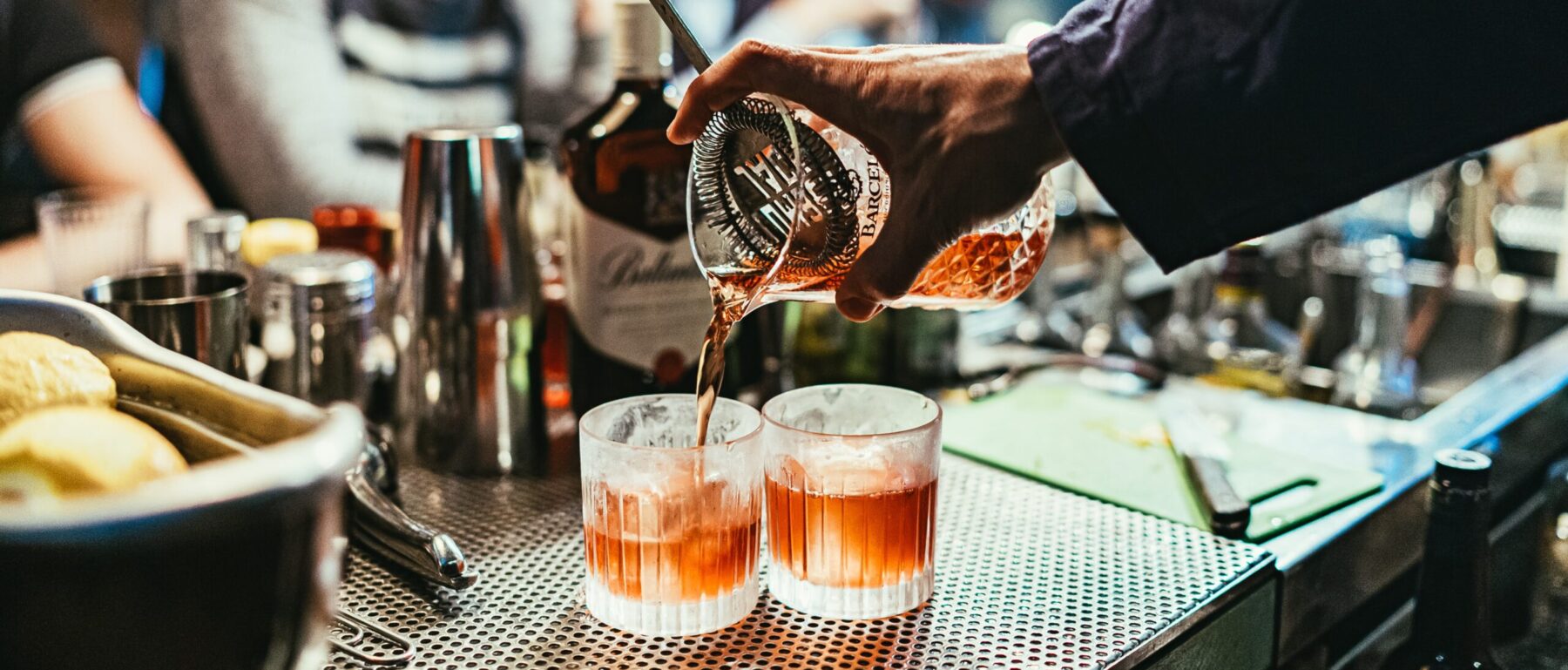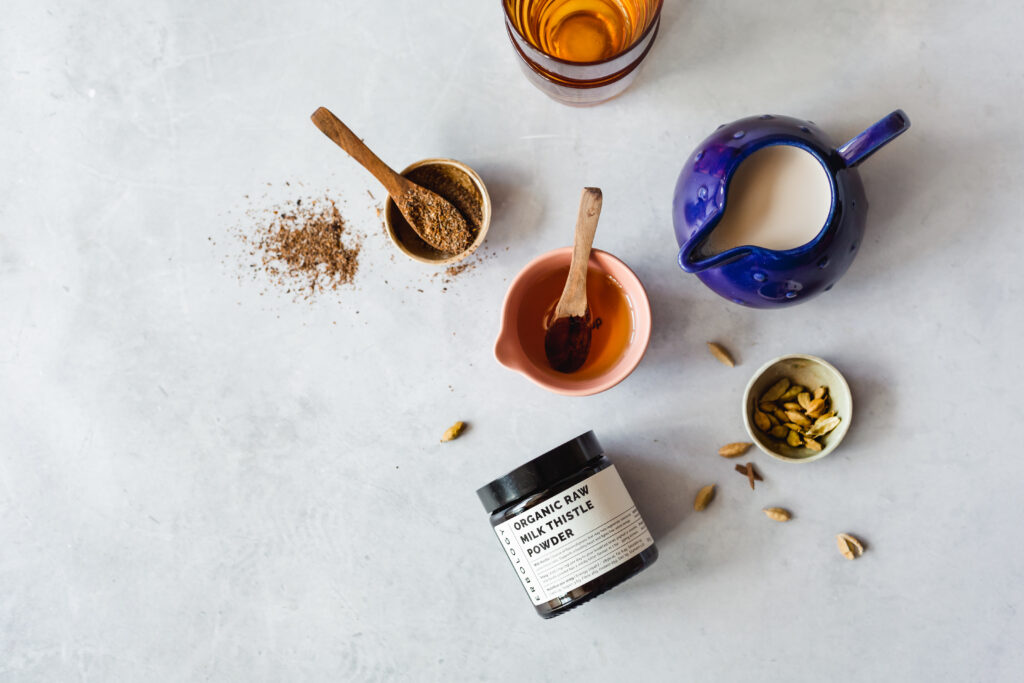
Many cultures have drunk alcohol for centuries. However, If you drink alcohol to excess and suddenly stop, you can expect withdrawal symptoms, which can persist. But how long does it take to detox from alcohol?
November 22, 2022 6:23 pm September 14, 2022 5:55 pmWhat is alcohol?
Firstly let’s recap on alcohol and what it is. Alcohol is a psychoactive drug that has been recreationally consumed in drinks by many cultures for centuries. Chemically speaking alcohol refers to the formula C2H5OH, which scientists call ethanol. Naturally produced ethanol occurs when yeasts ferment sugars to generate energy.
Ethanol is a nutrient and contains around 7 kcal per gram. Carbohydrates and protein contain 4 kcal per gram, while fat contains 9 kcal per gram. However, unlike carbohydrates and fat which can be stored and utilised in time of need, alcohol is not stored and remains in body water until eliminated.(1)
When consumed, alcohol absorbs into the bloodstream through the lining of the stomach and small intestines, and travels to the brain. This process can occur as quickly as 30 seconds or up to 20 minutes. Alcohol has an acute effect on the complex structures of the brain. It blocks chemical signals between brain cells (neurons), leading to immediate symptoms of intoxication. Typically, at low levels, alcohol makes people feel relaxed. However, it can impair coordination and judgement.(2)
What is detoxing?
Detoxing is the removal of toxic substances from the human body. The liver removes toxins from the blood, they then become processed for elimination. Although toxin elimination primarily occurs in the liver it can also occur in the kidneys, lungs, and skin during a body detox.
In the liver, enzymes break down alcohol at a rate of about one standard drink per hour. However, if alcohol is consumed faster than one standard drink per hour, alcohol will remain in the bloodstream.(3)
The liver is resilient and is even capable of regenerating itself. However, a portion of liver cells die each time the liver has to process alcohol. In short, the liver can regenerate cells, but heavy drinking may result in permanent damage to the liver.(4)
Alcohol detoxing is the sudden halting of alcohol intake in individuals, as the body attempts to rid the system of waste products and toxins from excessive, long-term alcohol consumption. In a treatment setting this is usually accompanied by medication, medical observation, and counselling. So how long does it take to detox from alcohol?
How long does it take to detox from alcohol?
The higher a person’s blood alcohol concentration (BAC), the more severe the effects of alcohol are and the longer it will take for their body to process all the alcohol they’ve consumed. In terms of BAC, alcohol metabolism is typically at a rate of 0.015 per hour. Therefore, if BAC is 0.07, then it will take about 4.5 hours for the body to process and eliminate the alcohol consumed.(5)
Factors that influence the rate of alcohol metabolism:
- Age. As age increases so does the amount of time alcohol stays in the liver. As a result unprocessed alcohol remains in the bloodstream longer.
- Gender. Females typically have a higher body fat percentage and lower percentage of body water compared to men, therefore females may process alcohol slower.
- Time since last drink. In the case of binge drinking, the liver will have trouble keeping up.
- Medication. Certain medications impact how the body is able to process alcohol e.g antibiotics.
- Weight. A person with a higher body weight may have more water in their body, which may dilute the alcohol in their blood. A person with a lower body mass will generally have less water in their body, and hence more alcohol in their blood.
What are the withdrawal symptoms of a detox from alcohol?
Alcohol suppresses the central nervous system, causing feelings of relaxation. In general, the body works to maintain balance and will signal the brain to produce more receptors that excite or stimulate the central nervous system.(6)
However, when alcohol intake is stopped, not only is alcohol taken away from the original receptors but also from the additional receptors the body produces. As a result, the nervous system is overactive, causing symptoms including:
- Anxiety
- Sweating
- Nausea
- Irritability
- Increased heart rate
- Tremors
Excessive, long-term drinkers are more likely to experience negative side effects during detox, some of which can be dangerous. This is because alcohol abuse creates a false homeostasis. Disrupting this balance and restoring the individual to a healthy state is a process that is as essential as it is delicate.(7)
More severe symptoms of alcohol withdrawal include:
- Hallucinations
- High body temperature
- Illusions
- Paranoia
- Seizures
Withdrawal symptom timeline of a detox from alcohol
Although the human body can metabolise alcohol in a matter of hours, withdrawal symptoms can span over a few days. General guidelines on the 4 stages of alcohol withdrawal timeline include:
- 6-12 hours. The initial symptoms of alcohol detox are mild, but can quickly begin to worsen as time goes on. However, a person with a history of heavy drinking could suffer from seizures.
- 12-24 hours. Symptoms may become increasingly severe. In addition, a tiny percentage of people experience visual and auditory hallucinations at this stage.
- 24-48 hours. In general, symptoms will continue. These symptoms may include headaches and abdominal pain. However, hallucinations and panic attacks can occur during this time as the body rids alcohol from its system.
- 48-72 hours. Different withdrawal symptoms may come and go. 3-5% of people may experience a severe form of alcohol withdrawal known as delirium tremens. A person with this condition can have a very high heart rate, seizures, or a high body temperature.
- 72 + hours. Alcohol withdrawal symptoms are commonly at their worst. In rare cases, moderate withdrawal symptoms can last for a month. These include rapid heart rate and illusions.
If a person goes through minor withdrawal, their symptoms usually peak at 10-30 hours and start to decrease after 4-5 days. By the time the first week of detox is completed, many of the withdrawal symptoms will begin to taper off. While some symptoms may persist for a few weeks, most of them are minor and can be treated with medication.(8)
Related readings
"Although the human body can metabolise alcohol in a matter of hours, withdrawal symptoms can span over a few days."
Alcohol and dehydration
Dehydration takes place when the body loses more fluid than it takes in. When the standard water content of the body is reduced, it upsets the balance of minerals (salts and sugar), which affects bodily functions. What’s more, water makes up over two-thirds of the healthy human body. It lubricates the joints and eyes, aids digestion, flushes out waste and toxins, and keeps the skin healthy.
Alcohol also affects the regulation of body fluids, causing people to urinate more and become dehydrated. Once alcohol is converted in the liver, it begins acting as a diuretic. Alcohol is processed by enzymes in the liver and converted into acetaldehyde. This substance can become toxic in high doses. In order to break this substance down and remove it from the body, the liver turns it into acetate. As a result, alcohol causes the body to remove fluids from the blood through the renal system, which includes the kidneys, ureters, and bladder, at a much quicker rate than other liquids.(9)
In addition, alcohol reduces how much vasopressin the body makes. This is an antidiuretic hormone, which causes the body to hold onto water, typically limiting how much urine the kidneys produce. The action of suppressing this hormone causes further dehydration.(10)
Early signs of dehydration include:
- Feeling thirsty
- Lightheaded
- Dry mouth
- Fatigue
- Dark coloured, strong-smelling urine
- Passing urine less often than usual
Alcohol and liver disease
There are many different types of liver disease. Alcohol-related liver disease (ARLD) refers to liver damage caused by excess alcohol intake. There are several stages of severity and a range of symptoms.
ARLD does not usually cause any symptoms until the liver has been severely damaged. When this happens, symptoms can include:
- Nausea
- Weight loss
- Loss of appetite
- Jaundice
- Swelling in the ankles and tummy
- Confusion
- Drowsiness
- Vomiting blood
- Passing blood in stools
If you suffer from ARLD, lifelong sobriety is recommended. Not drinking alcohol is the only way to prevent liver damage from worsening. Blood tests and liver function tests can identify if the liver is healing. Symptoms of liver diseases should improve within a few weeks after quitting drinking. However, depending on the severity of the damage, healing could take longer.(11)
Milk thistle and liver cleansing
Milk thistle seems to be particularly helpful when it comes to the liver. In fact, it is the most researched plant therapy for the healing of liver diseases. Moreover, across various studies, milk thistle has been shown to be helpful in healing alcoholic liver disease and non-alcoholic fatty liver.(12,13)
Our organic milk thistle powder is cold-pressed from 100% organic milk thistle seeds and nothing else. It’s rich in silymarin, a raw flavonolignan that can improve liver cell regeneration. It has a distinctive, slightly bitter flavour (a bit like lemon zest) and it can bring the most delicious flavour to dishes with complementary flavours! We recommend adding it to yoghurt, soup, or savoury dishes.
Another great option to reap the benefits of milk thistle is our 100% organic milk thistle oil. It has a delightful, light and nutty taste which makes it perfect for salad dressings, soups and dips. If you regularly eat Middle Eastern and Mediterranean foods, which often use flavoured oils in drizzles and dips, this could be a great option for you.
Although research is positive, alternative studies did not produce the same results. Therefore, more conclusive research is needed before any firm statements about the potential of milk thistle to detoxify the liver can be made.
Alcohol and brain damage
Brain damage is an injury to the brain caused by conditions such as head trauma and poor oxygen supply. The brain can be damaged in many ways and severity. Alcohol-related brain damage (ARBD) is a brain disorder caused by a person regularly drinking too much alcohol over several years.
Alcohol consumption over a long period of time, causes the brain to adapt to the blocked signals. This results in a more dramatic response to neurotransmitters. After alcohol leaves the system, the brain continues over activating the neurotransmitters, which causes painful and dangerous symptoms which may result in brain damage.(14)
There are different types of ARBD. Depending on symptoms, a person may have one of the following conditions, which include:
- Alcohol-related ‘dementia’. If a person has alcohol-related ‘dementia’ they will struggle with day-to-day tasks. The person may have memory loss and difficulty thinking things through.
- Wernicke–Korsakoff syndrome. This has two separate stages. Firstly, a person has intense inflammation (swelling) of their brain. If this condition isn’t treated quickly, the person may develop a more long-term condition, which has many of the same symptoms of dementia.
- Traumatic brain injury. A form of acquired brain injury, occurs when a sudden trauma causes damage to the brain.
- Alcohol-related stroke. Liver damage due to too much alcohol can stop the liver from making substances that help the blood to clot. This can increase your risk of having a stroke caused by bleeding in the brain.
- Other rarer forms of ARBD
Five stages of alcoholism
Alcoholism is a chronic, yet common medical disorder that affects millions of people all over the world.
5 stages of alcoholism:
- Occasional abuse and binge drinking. General experimentation with alcohol. Binge drinking is a part of ‘partying’ culture in young adults.
- Increased drinking. Alcohol consumption becomes more frequent. For example, instead of just drinking at parties once in a while, they drink every weekend.
- Problem drinking. Frequent, uncontrolled alcohol abuse eventually leads to this stage. They may become more depressed, more anxious, or start losing sleep but enjoy its effects too much to care. They can start to experience the impacts of their habit on social changes e.g. relationship issues.
- Alcohol dependence. Alcoholism has 2 sides, dependence and addiction. It’s possible for people to be dependent on alcohol, but not addicted. They have an attachment to alcohol, which has taken over their regular routine. A tolerance to alcohol develops. As a result, they drink more to feel the effects. Moreover, increased drinking has more damaging effects on the body
- Addiction and alcoholism. The final stage is addiction. They no longer want to drink just for pleasure. Alcohol addiction is the physical and psychological need to drink.
Alcohol detox is the first step in treating alcoholism. During this time, alcohol is completely flushed from your body.
Conventional withdrawal treatment
To assess a person’s withdrawal symptoms and recommend treatments, doctors often use a scale called the Clinical Institute for Withdrawal Assessment for Alcohol. The higher the number, the worse a person’s symptoms are and the more treatments they likely need.
Individuals may not need any medication for alcohol withdrawal. Moreover, they can still pursue therapy and support groups alongside medication as they go through withdrawal and maintain sobriety. However, medication can help if a person experiences moderate to severe withdrawal symptoms. Here are some common medications that the doctors may prescribe:
- Benzodiazepines calm the central nervous system and can treat insomnia, anxiety and muscle spasms. Furthermore, they can reduce the likelihood of seizures during alcohol withdrawal.
- Naltrexone reduces alcohol cravings during the detox stage. In the event of a relapse, naltrexone works by inhibiting the high feeling that alcohol may cause. However, it can stimulate withdrawal symptoms, so people wait 7-10 days before taking it.
- Acamprosate helps the brain begin to function normally again after quitting drinking. Years of heavy drinking can significantly alter how the brain looks and works.
- Neuroleptic medications reduce nervous system activity and can be helpful in preventing seizures and agitation associated with alcohol withdrawal.
Nutritional support
In addition, the following nutrients can reduce withdrawal symptoms and balance nutrient deficiencies caused by alcohol use:
- Folate plays a role in blood cell formation. Furthermore, a poor diet and damaged digestive system lead to a deficiency in folate and a form of anaemia, which can occur due to enlarged blood cells that have not divided properly. While undergoing withdrawal treatment, a person may be given supplements containing folic acid for at least a couple of weeks until anaemia has been treated.(15) Foods naturally high in folate include broccoli, Brussels sprouts and peas.
- Thiamine (vitamin B1) is a common deficiency in patients with alcohol dependence. Cognitive impairments may be an early consequence of thiamine deficiency. Routine use of thiamine is recommended because the development of Wernicke encephalopathy or Korsakoff syndrome is disastrous in these patients and can remain unrecognised. Moreover thiamine and folate work together to ensure proper metabolism.(16) Foods high in thiamine include sunflower seeds, linseeds and almonds.
- Magnesium. Studies have found that magnesium deficiency is also very common in people dealing with alcohol addiction and withdrawal. Furthermore, magnesium supplements can diminish withdrawal complications, reduce the severity of their withdrawal symptoms, and lower a person’s need for anti-anxiety medication.(17) Seeds and nuts are abundant in magnesium.
So, is alcohol bad for you?
It’s okay to enjoy alcohol on occasion. As the saying goes with most things ‘everything in moderation’. There is evidence that suggests red wine may help prevent coronary artery disease due to its high antioxidant content. However, it is hard to unpick correlation and causation in these studies, and the benefits of moderate drinking are still not clear.(18)
Even a brief break from alcohol can have health benefits, such as lowering high blood pressure, and the risk of diabetes.(19)
In short, alcohol is a depressant that the body begins to rely on over the course of months and years of drinking. The brain eventually stops producing certain chemicals and becomes dependent on the drug. As a result, it takes time for the body to adjust when detoxing. In addition it impacts dehydration, metabolism of other nutrients, and in more severe cases brain damage and liver disease.
If you do suffer with an unhealthy relationship with alcohol, the time for help is now – seeking help for alcohol use is a huge step toward sobriety. That’s why the decision on where to get treatment should not be taken lightly.
We hope that we have provided clarity surrounding the question “how long does it take to detox from alcohol?”
Related readings
Latest articles
References
- Shorey RL. Effects of ethanol on nutrition. Journal of Chemical Education. 1979 Aug;56(8):532.
- Brust JC. Ethanol and cognition: indirect effects, neurotoxicity and neuroprotection: a review. International journal of environmental research and public health. 2010 Apr;7(4):1540-57.
- Cederbaum AI. Alcohol metabolism. Clinics in liver disease. 2012 Nov 1;16(4):667-85.
- Bellentani S, Saccoccio G, Costa G, Tiribelli C, Manenti F, Sodde M, Crocè LS, Sasso F, Pozzato G, Cristianini G, Brandi G. Drinking habits as cofactors of risk for alcohol induced liver damage. Gut. 1997 Dec 1;41(6):845-50.
- Paton A. Alcohol in the body. Bmj. 2005 Jan 6;330(7482):85-7.
- Mukherjee S. Alcoholism and its effects on the central nervous system. Current neurovascular research. 2013 Aug 1;10(3):256-62.
- Rachdaoui N, Sarkar DK. Effects of alcohol on the endocrine system. Endocrinology and Metabolism Clinics. 2013 Sep 1;42(3):593-615.
- Newman RK, Gallagher MA, Gomez AE. Alcohol withdrawal. InStatPearls [Internet] 2021 May 29. StatPearls Publishing.
- Zhu L, Pei W, Thiele I, Mahadevan R. Integration of a physiologically-based pharmacokinetic model with a whole-body, organ-resolved genome-scale model for characterization of ethanol and acetaldehyde metabolism. PLoS computational biology. 2021 Aug 5;17(8):e1009110.
- Harper KM, Knapp DJ, Criswell HE, Breese GR. Vasopressin and alcohol: a multifaceted relationship. Psychopharmacology. 2018 Dec;235(12):3363-79.
- European Association for the Study of the Liver. EASL Clinical Practice Guidelines: Management of alcohol-related liver disease. Journal of hepatology. 2018 Jul 1;69(1):154-81.
- Federico A, Dallio M, Loguercio C. Silymarin/silybin and chronic liver disease: a marriage of many years. Molecules. 2017 Jan 24;22(2):191.
- Ward J, Kapadia K, Brush E, Salhanick SD. Amatoxin poisoning: case reports and review of current therapies. The Journal of emergency medicine. 2013 Jan 1;44(1):116-21.
- Oscar-Berman M, Marinkovic K. Alcoholism and the brain: an overview. Alcohol research & health. 2003;27(2):125.
- Hillman RS, Steinberg SE. The effects of alcohol on folate metabolism. Annual review of medicine. 1982 Feb;33(1):345-54.
- Dervaux A, Laqueille X. Thiamine (vitamin B1) treatment in patients with alcohol dependence. Presse Medicale (Paris, France: 1983). 2016 Nov 3;46(2 Pt 1):165-71.
- Shane SR, Flink EB. Magnesium deficiency in alcohol addiction and withdrawal. Magnesium and trace elements. 1991 Jan 1;10(2-4):263-8.
- Karatzi KN, Papamichael CM, Karatzis EN, Papaioannou TG, Aznaouridis KA, Katsichti PP, Stamatelopoulos KS, Zampelas A, Lekakis JP, Mavrikakis ME. Red wine acutely induces favorable effects on wave reflections and central pressures in coronary artery disease patients.









Comments (0)